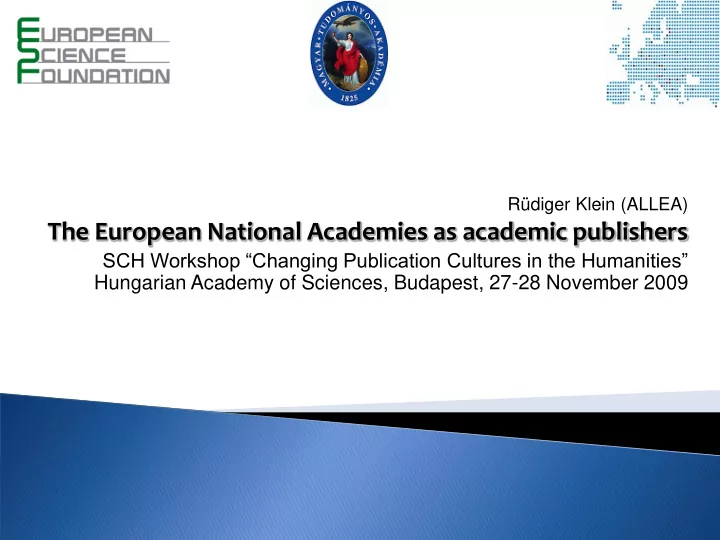

Rüdiger Klein (ALLEA) The European National Academies as academic publishers SCH Workshop “Changing Publication Cultures in the Humanities” Hungarian Academy of Sciences, Budapest, 27-28 November 2009
Academies of Sciences and Humanities in the European research landscape debate: as learned societies exchange of ideas on research and research-related issues; advise: as “think tanks” address science policy and topical societal issues; support (for excellence): award grants, fellowships and prizes and are involved in evaluation; promote: science communication, science education and outreach; produce: research institutes and infrastructures Rüdiger Klein 27 November 2009, HAS/SCH Publication Cultures
ALLEA LEA Membership: rship: 53 national academies from 40 countries (Council of Europe) Founded in 1994 Interacts with global inter-academy networks, including: - ICSU: International Council of Science (for SocSci notably: IHDP; ISSC) - IAP/IAC (science academies only) - UAI: Union Académique Internationale (classical Humanities) Rüdiger Klein 27 November 2009, HAS/SCH Publication Cultures
Chang anging ing publicat cation ion culture ures (some of the questions at the origin) The role of scholarly monographs in evaluations of Humanities ( < focus on journals elsewhere; wrong focus for ERIH?) New assessment regimes leave ( < less and less time for production and consumption of monographs: authorship / readership) Internationalisation of “science” (also: global Humanities) ( < role of national languages?) Technological advances ( < digital revolution) ( > changing reading habits, changing hermeneutics?) ( > return to hunter-gatherer humanities?) Rüdiger Klein 27 November 2009, HAS/SCH Publication Cultures
Changing ging public ication ation cu culture ures (some of the subsequent reflections) Change: - time: “half - life” ( interdisciplinarity?); - place: global Humanities <connectedness> (national foundations?) – actors: authors; readership (impact?); “publishers” Publication: publishing & public (scholarly / scientific communication) Culture: - proposal - product Rüdiger Klein 27 November 2009, HAS/SCH Publication Cultures
Changing framework conditions A LLEA’s semi-permanent expert Standing Committees and goal-oriented Working Groups … reflect on / analyse the changing framework conditions for “ doing research” in - Europe; make recommenations to political domain (and sometimes to scientific - communities themselves); elaborate and propose tools developed “ by scientists for scientists ” to ensure the - scientific domain continues as much as possible to be self-regulated (e.g.: science ethics; IPR; evaluation etc.). In this context : Work on research infrastructures; - Work on scholarly publishing and Open Access - Challenging framework conditions for Humanities publishing in Europe Rüdiger Klein 27 November 2009, HAS/SCH Publication Cultures
Data: - survey of 53 Member Academies on scholarly publishing (still running; as yet incomplete) - discussions among MA’s on Open Access (critical issues: role of learned societies; apparently unresolved IPR-related matters) - some insights into national debates Rüdiger Klein 27 November 2009, HAS/SCH Publication Cultures
Academies as academic publishers (some patterns): - practically all 53 Member Academies are engaged in scholarly publishing (depending on types, also in the Humanities) [HU: since 1828; since 1996 with WoltersKluwer; 59 journals, textbooks] - practically all MA’s also publish monographs in the respective national languages [in several cases this is part of their mission] - most MA’s run scholarly publishing not as profit-making exercise [important exception (and brake on joint OA activity) UK: journals published by the Royal Society of London] [LT: income stays within publishing unit] [exchange networks: AT over 1.000 partners in 82 countries] Rüdiger Klein 27 November 2009, HAS/SCH Publication Cultures
Academies as academic publishers (some more patterns): - most MA’s typically very small publishing divisions - many MA’s practice some forms of outsourcing [NL: totally decentralised, despite ECPA] - many “research performing ” MA’s leave publishing activities to their institutes 1.000’s of publications (> based on central or competitive acquired grants) [BG: varying quality, but also including highest standards (CMRC)] - many MA’s struggle with lack of central support under conditions of changing publication environments Rüdiger Klein 27 November 2009, HAS/SCH Publication Cultures
Academies as academic publishers (still more patterns): few MA’s are engaged in publishing/publisher networks: - - Association of Learned and Professional Society Publishers - European Association of Science Editors - Federation of European Publishers - International Association of Scientific, Technical and Medical Publishers - Open Access Scholarly Publishers Association - etc. typically only one per network - Inconsistent efforts to have journals included in relevant databases and indices - [LT: all; EE: in Humanities/SocSci most indices, incl. WoS and Scopus, but not ERIH: interdiscipinarity] poor to no exchange of knowledge on scholarly publishing among MA’s - Rüdiger Klein 27 November 2009, HAS/SCH Publication Cultures
Academies as academic publishers (some patterns re Open Access and related issues): many MA’s (but by far not all) have discussed, few have signed up to relevant - declarations, few practice or actively encourage OA publishing (practically never for monographs) [encourage: financial and/or technical support; debates and training] [DE: Working Group electronic publishing; CH; AT: manual; e-books] Few academy publishers have functioning relationship with relevant digital - repositories (very few have significant DR’s themselves) [EE: transfer of digital data to national library] [CEJSH] [SE (KVHAA): pdf to author with encouragement to enter it into DR] - Practically no MA has reflected on / acted on possible link between publishing activity and research infrastructures: linguistics; archaeology etc. Rüdiger Klein 27 November 2009, HAS/SCH Publication Cultures
Challenging framework conditions for Humanities publishing in Europe and the role of the National Academies - Can Academies make better use of the technological advances (OA; DR; RI): sharing experiences? - Can Academies develop new models for financing scholarly monographs: research performing agencies? - Can Academies develop evaluation frameworks that do not discourage the use of national languages for Humanities, while improving international visibility of Humanities research (linguae francae)? - Can Academies define appropriate quality criteria for good outreach publications (wider appeal of Humanities as equivalent of “ science & society” remit in the hard sciences)? Rüdiger Klein 27 November 2009, HAS/SCH Publication Cultures
Recommend
More recommend